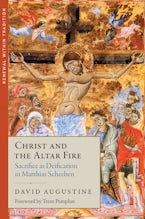
Christ and the Altar Fire
Sacrifice As Deification in Matthias Scheeben
Published by: Emmaus Academic
Imprint: Emmaus Academic
406 Pages, 152.00 × 229.00 mm

Published by: Emmaus Academic
Imprint: Emmaus Academic
406 Pages, 152.00 × 229.00 mm